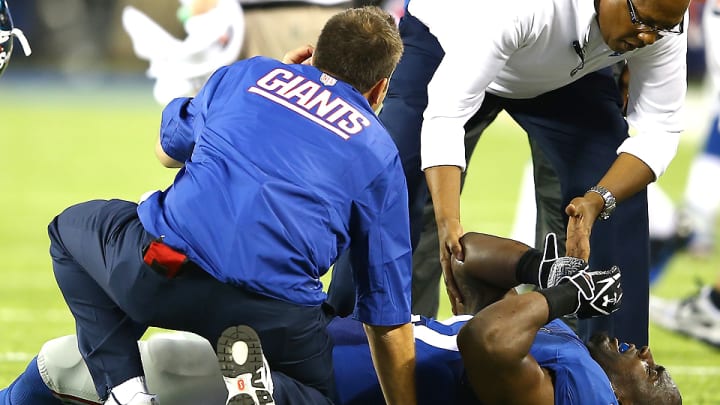Pay Us for the Preseason!

This league is a fraternity; you never want to see a brother go down. That’s what makes this an especially hard summer for NFL players, with the number of ACL and other season-ending injuries we’ve seen so far. It’s a tragic reality of this game: Injuries happen in every walk of our lives, from minicamp non-padded practices in June to 11-on-11 sessions in August. Yet there’s one injury scenario that makes me cringe more than any other: preseason games.
Why preseason games? Take the case of Stevie Brown, the Giants safety who tore his ACL over the weekend. I don’t know Brown well, but it’s difficult to put into words how disheartened I felt when I heard about his knee. This is a guy who had a great season last year and was on the verge of becoming a name in this league. He was risking his body in a game that, in a sense, doesn’t matter. The Jets beat the Giants 24-21 in overtime, and it didn’t impact the regular season record and shouldn’t have impacted Brown’s job. One thing it didn't impact? His wallet. That’s right: Preseason games aren’t part of our contracts, and the game checks don’t arrive until after Week 1 of the regular season (veterans get a weekly stipend in the neighborhood of $1,500).
But Brown was playing his best football, intercepting a first-quarter pass only to take a dive on the return, clutching his knee. Now he’s done for the season. Same for Dustin Keller, the Dolphins tight end who blew out his knee in Week 2.

The easy answer to the problem would be to scrap or shorten the preseason. We’re pros; many of us have been playing this game for more than 15 years. What do we need a month of fake games for, right?
Wrong.
The preseason isn’t just invaluable to rookies and practice squad candidates; it’s a testing ground for the starters. Want to know what we’re made of in Seattle? Watch our first defensive drive last week in Green Bay. Aaron Rodgers came out in a no-huddle—surprising to us, but not a shock after seeing it on film and playing Peyton Manning the week before. Rodgers found Jermichael Finley over the middle for 22 yards on the sixth play of the drive for a first down, and with our backs at the North end zone, we shut them down. Brandon Mebane got a stop and Rodgers threw incomplete twice, with the Packers settling for a field goal. Giving up three points was a net loss for us, but it was a small victory in a moment of adversity; a real confidence builder. The game made us better as a football team, and in Seattle, we play every game like it counts, so I wouldn’t trade any of them. (People think that’s an exaggeration, but it’s the truth: It’s such a competitive environment under Pete Carroll; I’m an All-Pro and I still feel like I’m fighting for my job every day.)
All told, there’s only one way to soften the blow of injuries like Brown’s: Either make the experience more affordable for fans, or pay players for the risks we’re taking. Now, I hesitate to complain about money. We all make a really good living playing this game. Yet there’s a certain economic inequity at work here. Logically, if a Seahawks fan has to pay over $375 dollars for club seats on Thursday when we play the Raiders in the final preseason game, and the beers in the 300 section still cost the standard $8, and the owners are still pulling in near the same amount they would for a regular season game, why shouldn’t players get the same cut we’ll soon earn when the games count?
If teams believe these games aren't relevant enough for us to be paid to play in them, charge the fans comparative prices. What would that look like? Well, teams will spend about $135 million on their 53-man roster this year—an average $2.5 million per player, per year. My $1,500 preseason check constitutes close to 1% of the average weekly game check. Using the same math (and logic) can you see any team or ticket broker charging $3.75 for that club seat?
Me neither, especially not when 74,000 Packers fans are willing to pay full price to see Aaron Rodgers play one quarter of football.
So the only solution is to cut the players in on the profits. It wouldn’t make the injuries to Brown and Keller stomachable, but it would be less frustrating if they were getting more than per diem checks for their troubles. Contrast that with the $50 million each NFL team makes per year on ticket sales for 10 home games. With all 32 teams playing two of those games in the preseason, that means some $160 million of NFL ticket revenue is earned on the backs of men earning a relative pittance who, if catastrophe strikes, may never see another game check.
